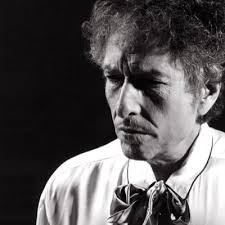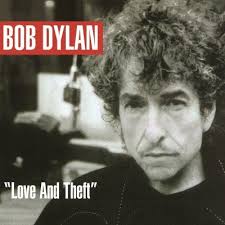Love and Theft
| Bob DylanLove and Theft
"Love And Theft" (generally referred to as Love and Theft) is the 31st studio album by American singer-songwriter Bob Dylan, released on September 11, 2001, by Columbia Records. It featured backing by his touring band of the time, with keyboardist Augie Meyers added for the sessions. It peaked at #5 on the Billboard 200, and has been certified Gold by the RIAA. A limited edition release included two bonus tracks on a separate disc recorded in the early 1960s, and two years later, on September 16, 2003, this album was one of fifteen Dylan titles reissued and remastered for SACD hybrid playback.-Wikipedia
Critic Reviews
Show All-
 Rolling Stone
Rolling Stone
September 27, 2001. Love and Theft takes us on a full-blown tour of American song in all its burlesque splendor, which includes, of course, Dylan’s own psychedelic mutations of the blues. Talk about bringing it all back home: Dylan veers into country, ragtime, vaudeville, deep blues, cocktail-lounge corn, the minstrel show and the kind of rockabilly he must have bashed out with his high school band more than forty years ago.
-
 Rolling Stone
Rolling Stone
September 11, 2016. True to his word, Dylan would deliver an album steeped in Chicago blues, Tin Pan Alley crooning, jump blues and Western swing. Supporting Dylan on that journey was his then-current band, one of the sharpest ensembles ever to back him up – guitarist Charlie Sexton, guitarist-fiddler–banjo player Campbell, bassist Tony Garnier and drummer David Kemper.
-
 AV Music
AV Music
September 11, 2001. With Love, he seems to have returned from the experience with looser limbs, a warmer heart, and a keener eye. A blues-and-country-drenched collection unreservedly in love with music predating WWII, and unafraid to throw in the phrase "booty call" and at least one terrible joke, Love seems to come from a far more freewheeling Bob Dylan than the one on The Freewheelin' Bob Dylan, or virtually any other album he's recorded.
-
 BBC Music
BBC Music
Gone is the swampy ambience of the last album's Daniel Lanois production, and what we get instead is a band that rocks and swings with verve, swagger and Nashville clarity. Ranging from Country ("By And By"), Blues ("Lonesome Day Blues") and Rockabilly ("Summer Days") to a jazzy swing worthy of The Hot Club of France ("Floater (Too Much To Ask)") - Bob treats us to a, frankly, sprightly jog through just about every style available to a man of his experience.
-
 All Music
All Music
. . . Love and Theft, is his true return to form, not just his best album since Blood on the Tracks, but the loosest, funniest, warmest record he's made since The Basement Tapes.
-
 Pop Matters
Pop Matters
September 10, 2001. On September 11, Bob Dylan released a master work buzzing and sparking with the depthless energy of American folk music and charged with a faith in the goodness and potential harmony of the human community as wild and oceanic as Whitman's.
-
 Spin
Spin
December 11, 2001. Backed by the crack band he's been dragging across the land for years, the man celebrates his 60th year by mouthing off and telling tales.
-
 Mobile Fidelity Sound Lab
Mobile Fidelity Sound Lab
Bob Dylan's Love and Theft is a visionary train ride through the vast American landscape and all its hills, valleys, mountains, river towns, and urban and rural settlements. As they burrow into villages and barrel across trestle bridges, the 2001 record's songs introduce us to outlaws, outliers, gamblers, brawlers, tricksters, bootleggers, and scoundrels. It is, in effect, a commanding survey of and plunge into American music.
-
 Countdown Kid
Countdown Kid
July 13, 2013. Dylan’s various narrators on “Love And Theft” are ribald, fierce, funny, and generally unapologetic about the way they live their rough-and-tumble lives. The musical settings, ranging from bruising blues to vintage torch songs, are also perfectly tuned to Bob’s vibrant words.
-
 Perfect Sound Forever
Perfect Sound Forever
February, 2012. Dylan stretches the possibility of blues music as a form of narrative while somehow remaining true to its traditions. The songs are rich in imagery, biting in wit, and sometimes funny as hell. They are anything but formulaic and, maybe for the first time in the blues idiom, the lyrics are as important as the vibe.
-
 Vocals On Top
Vocals On Top
September 11, 2011. The album was and is unlike any music anybody else was and is making. Dylan found a way to create music that sounds like it belongs in The Great Gatsby but still sounds modern and classic at the same time.
-
 The Super Audio CD Reference
The Super Audio CD Reference
January 23, 2005. . . . there isn't a musical influence later than 1959 on this, the supposed follow up to Time Out Of Mind. It's also one of his most cohesive musically, as he (wisely) let his touring band play at the sessions. . . .
-
 The Music Box Magazine
The Music Box Magazine
January, 2002. All the while, Dylan pays tribute to the music he loves while stealing what he needs to write a new chapter in his monumental legacy -- hence the title Love and Theft. Though any of these songs easily could have been written well before the '50s drew to a close, Dylan invests them with such urgency that he makes them sound incredibly relevant today. Better still, he sounds like he's having the time of his life. As a result, the blues have never been more fun than this
-
 The Bluegrass Situation
The Bluegrass Situation
December 7, 2018. It’s perhaps Dylan’s funniest album, full of jokes both highbrow and low, literary and vaudevillian.
-
 Julian Cope Presents Head Heritage
Julian Cope Presents Head Heritage
June 3, 2002. Stylistically, this album jumps from stompin'-whisky blues, to blue grass banjo music, to Hank Williams-style crooning, to raunchy rock, to dirges made up of the observations of a wandering ghost -- so, you can rest assured Mr. Dylan is giving you his encyclopedic best.
-
 The Current
The Current
September 11, 2017. Backed by his crack touring band, Dylan dug into the dark depths of Americana he’d been plumbing for decades to come up with an album that jumps from past to present, from myth to reality, as eccentrically and as effectively as John Wesley Harding.
-
 Robert Christgau
Robert Christgau
If Time Out of Mind was his death album--it wasn't, but you know how people talk--this is his immortality album. It describes an eternal circle on masterful blazz and jop readymades that render his grizzled growl as juicy as Justin Timberlake's tenor--Tony Bennett's, even. It's profound, too, by which I mean very funny.
-
 The Guardian
The Guardian
Love and Theft is as cranky and erratic an album as 2001 is likely to bring. Anyone who harbours a secret desire to hear Bob Dylan tackle the sort of jazz-inflected ballad favoured by 1940s crooners - a select band of listeners, surely - will come away satisifed.
-
 Paste Magazine
Paste Magazine
September 12, 2012. Love and Theft is both predictable and completely surprising. It features all the characters and signature Dylan vocal stylings that is to be expected, but songs like “Honest With Me” and the fascinating shifting pace of “Cry a While” show that not only does Dylan have a lot of life left in him and his music, but that he’s still releasing some of his best music.
-
 Wilson & Alroy's Record Reviews
Wilson & Alroy's Record Reviews
Most of the record is as mind-blowingly unambitious and inane as Under The Red Sky, but it's elevated by one fun rocker ("Honest With Me") and the occasional trenchant verse ("Last night the wind was whispering something, I was trying to make out what it was/Yeah, I tell myself something's coming, but it never does").
-
 George Starostin's Reviews
George Starostin's Reviews
Seriously now, this is an amazing album. It's not rambunctiously GRRREAT, definitely not a stupid five-out-of-five or A++ or whatever else reviewers all over the world have hurried to give it; once the hype dies down, Love And Theft will occupy its deserved place as a minor gem somewhere in between Bob's early acoustic stuff and his early Seventies' introspective country-rock exercises.
-
 People
People
September 17, 2001. His last album, Time Out of Mind (1997), sounded like a postcard from the cemetery. Now Dylan is shaking off the tombstone blues; at times he is coltish, toying with words, cracking jokes (“Po’ boy…call down to room service/ Says, ‘Send up a room’ “) and reflecting on love—not always ruefully.
-
 Vintage Rock
Vintage Rock
As it seems, things couldn’t be clearer for Bob Dylan as he once again takes flight behind Love And Theft, reaching beyond what is simply blowing in the wind.
-
 Mark's Record Reviews
Mark's Record Reviews
Speaking for myself, I'm astonished that this album is so tremendously entertaining. And not even just entertaining, but CATCHY! Even the songs that seem a little limited by genre specificity at first soon hit home with awesome melodic breaks, harmonizing organ tones in the background and/or surprisingly singalongable vocal melodies.
-
 The Daily Beast
The Daily Beast
May 24, 2016. The second album of his latter-day “renaissance” period buzzes with the sounds of the South, leaning heavily on Harry Smith’s famed folklore, Delta blues mythology, the ambience of a sweaty juke joint, and a Fogerty-like appreciation of all things swampy.
-
 Warehouse Eyes
Warehouse Eyes
"Love And Theft" may prove to be Dylan's swan-song in terms of studio recordings, although I hope I am wrong in this. If however that is the case and all we have to look forward to is an endless stream of greatest hits packages, then Dylan could have left us no better legacy than this wonderful album.
-
 Arizona Daily Wildcat
Arizona Daily Wildcat
September 18, 2001. Dylan seems to be returning to his younger, more carefree days in this album. Or maybe he's returning to a carefree youth that his prodigy had forced him to skip. Don't get me wrong - this album isn't without the wisdom we have been accustomed to hear from Dylan



Rate This Album and Leave Your Comments